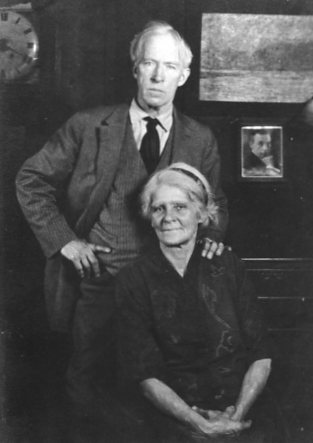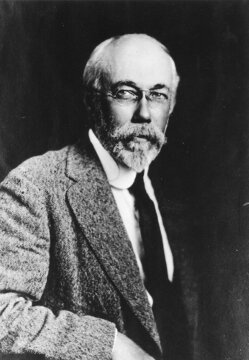A Model Community
After the failed state-wide invasion, two of the Philadelphian campaigners, George Frank Stephens (1859-1935) and William Price (1861-1916), decided to test the single tax experiment on a smaller scale. Their conception of the new Georgist colony differed from the aims of the Delaware Invasion in that it incorporated the teachings of the British arts-and-crafts designer and social activist William Morris (1834-1896) and the Russian revolutionary Peter Kropotkin (1842-1921).
At the 1923 International Conference on the Taxation of Land held at Oxford University, Frank Stephens described how he and Will Price decided to create the artist colony in northern Delaware:
In the practice of the art for which I was trained, sculpture, I met a gifted and famous architect, Will Price, one of the wisest and finest of men, and had the good fortune to convert him to the religion of Henry George. We were both successful, speaking after the manner of men, in the practice of our arts, and both bitterly disappointed that the more success made that practice possible, the further we were from it, being merely employers of more and more people to do what we wanted to do ourselves.
We had learned William Morris’ truth that nothing can be done for Art until we have bridged the terrible gulf between rich and poor. We were so disgusted with civilization that we determined then and there to go out into the open and make a better one, in which the land theory of Henry George should make the social basis for the industrial theory of Kropotkin and the art theory of William Morris.
“So my wife [Eleanor] and I searched out…an abandoned farm containing about 162 acres of rolling hill country…beautiful woodlands and the ugliest house in the United States [the Derrickson Farmhouse]. There the village was founded, and there my son [Don] and I sat for seven or eight years trying to coax the farm laborers of the countryside to take the land in perpetual leases, for which was to be paid the full economic rent, reassessed yearly, from which land value tax, we, as trustees holding the land as the communal property of all who should live there, would pay all taxes levied on the people by the state, county and hundred, turning the balance of the land rent over… to be spent for community improvements and upkeep.
The $9, 000 Derrickson farm was purchased with contributions by both Stephens and Price (totaling $2,500) and a mortgage for the remaining $6,500 in Stephens’ name. Both founders retained the original buildings on the land as reimbursement for their financial contributions. Stephens’ mortgage designated to only cover the 70 acres of woodland, leaving the rest of the acreage to be divided into lots debt-free for leaseholders. Joseph Fels, a millionaire and fellow Georgist, soon agreed to hold the mortgage, thus eliminating the debt for the founders and giving the soap manufacturer a stake in the community.
The land was divided into lots of different shapes and sizes (and therefore values), with two large open commons and the woodlands reserved as communal spaces. Each lot was available to residents for 99-year renewable leases. Any improvements on the land were to benefit the leaseholder and would not be included in the yearly tax assessment.
Despite the hesitation of the colony’s neighbors to join, Stephens and Price were able to attract many intellectuals and radicals from Philadelphia. The labor organizer and activist Ella Reeve “Mother” Bloor (1862-1951), the radical economist Scott Nearing (1883-1983), and the writer Upton Sinclair (1878-1968) all called Arden home during the early years.


